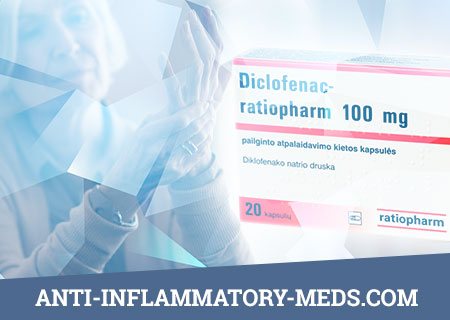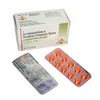Diclofenac: its uses, contraindications and side effects
Diclofenac is a medicine that helps to inhibit inflammation. It is prescribed for rheumatic inflammation and osteoarthritis, but also for cases of fever, acute injury and menstrual cramps. Diclofenac is a strong pain reliever and is prescribed when lighter analgesics like paracetamol do not work well.
It is a pharmaceutical treatment which is highly produced and traded. Its composition makes it a relatively non-selective inhibitor of cyclooxygenase. It serves essentially as an analgesic and antipyretic, classifying itself among non-steroidal anti-inflammatory drugs. (NSAIDs)
Its functioning begins with the blocking of some enzymes in the patient's body. As a result, the inflammatory chemicals that the body produces are inhibited and inflammation and pain are reduced.

In many countries, this drug can be obtained without a prescription. For example, in countries such as Switzerland and Germany, 12.5 mg of diclofenac can be purchased under the name Voltarén. It is known in the United States, as Voltaren, cataflam and zipsor.
Uses of diclofenac
Among the diseases for which diclofenac sodium is indicated are:
- Acute rheumatism, osteoarthritis, arthritis rematoidea, lumbalgia.
- It is also indicated for ankylosing spondylitis, post-traumatic inflammation, acute migraine and as prophylaxis for postoperative pain.
- Period pains.
- Actinic keratosis (AK) is treated in its topical form. Very common in older adults.
- It is used in ophthalmic treatment drops, to treat acute and chronic non-bacterial inflammation of the anterior part of the eyes.
- It has utility for traumatic corneal abrasion pain.
- The diclofenac is widely used to treat chronic pain in cancer, endorsed by the World Health Organization (WHO)
Forms of presentation
Its forms of presentation are by oral, intramuscular, rectal and topical. Among those that are in the pharmacy are:
- Soft capsules resistant to the gastric acid of 25 and 50 mg.
- Rapid 50mg effervescent adsorption tablets
- Tablets of slow and controlled release of 75, 100 or 150mg
- Suppositories of 50 and 100mg
- Powder for 50 and 75mg injectable solution
- Gel or cream
- Extended-release patch
- Ophthalmic drops (for the eyes).
Usual dosage
- Adult: As an attack treatment in rheumatology: 1 tablet, 3 times daily for 7 days maximum. In maintenance treatment in rheumatology: 1 tablet, 2 times a day. For pain relief: 1 tablet, 2 times a day.
- In children over 35 kg (approximately 12 to 15 years): 2 to 3 mg per kg and per day, divided into 2 or 3 doses, not exceeding 3 tablets per day (150 mg per day).
Tips on usage
This medication is best taken in the middle of meals to limit unwanted digestive effects. The tablets should be swallowed as it is with a glass of water and without being crushed.
Side effects
The use of Diclofenac may cause some side effects. Everyone does not feel these side effects, it differs according to people. Most side effects occur the first few days you use the drug, and then as they go. Below are some common side effects:
1. Health
- Cardiac Risks: According to research conducted by an FDA Medical Officer, David Graham, it was concluded that diclofenac sodium increases the risk of myocardial infarction.
- Gastrointestinal effects: This drug should be consumed with gastric protectors. Patients who use this formula for a long time may have occult gastrointestinal bleeding and gastric ulceration. In these cases, the use of this treatment should be discontinued.
- Depression of the bone marrow: Leukopenia, aplastic anemia occurs infrequently. But, if you do not have strict vigilance in the patient, it can be a serious threat to life and be irreversible. This effect is related to its weak inhibitor characteristic of thrombocytic aggregation.
- Renal failures: Diclofenacs are NSAIDs. They are commonly associated with adverse renal effects caused by the reduction in the synthesis of renal prostaglandins.
- Hepatic: Serious liver reactions have been reported, including liver necrosis, jaundice, fulminant hepatitis with and without jaundice and liver failure. Some of these reported cases resulted in deaths or liver transplants.
- Pregnancy: Adverse effects for the unborn child have been demonstrated when NSAIDs are used during the last 4 months of pregnancy. The risk exists even with a single dose and even if the pregnancy is complete. Use of this medication is contraindicated during this time. During the first 5 months, the effect of this medicine is not known: only your doctor can evaluate the possible risk of its use in your case.
- Breastfeeding: The NSAIDs are excreted in human milk. Their use in breastfeeding women is not recommended without medical advice.
- Other health-related side effects: headache, dizziness, nausea, diarrhea, abdominal cramps, vomiting, skin rash.
- Less common side effects: tinnitus, palpitations, inflammation of the liver, accumulation of fluids.
Warning: Do not hesitate to contact your doctor if the side effects of Diclofenac get worse. If you experience any side effects such as: difficulty breathing, swelling of the face or feet and feet, chest pain or vomiting of blood, stop using Diclofenac and consult your doctor.
The doctor will determine if you can use Diclofenac. In some cases, it is not recommended to use this medicine, for example in case of severe liver abnormalities or serious kidney problems.
2. Environmental
In the Indian subcontinent, it has been found that the use of this drug produced a significant decrease in the vulture population up to 95%. It was established that the animals died due to renal failure, a secondary effect since they ate the remains of dead animals and human bodies that had accumulated residues of diclofenac sodium because they had been treated with the prescription of this drug.
3. Veterinary use
Despite its known negative effects, it has been authorized for use in cattle in Europe. However, in some countries, federations have been created to avoid ecological disasters, given that they inhabit a high percentage of vultures that prevent the emission of almost 200,000 tons per year of greenhouse gases from the consumption of corpses.
Relationship and difference between diclofenac sodium and diclofenac potassium
Both are major forms of pharmaceutical production. The difference is in the way the body absorbs it:
- Sodium is slower: It is useful when patients need to reduce inflammation; such is the case of voltaren.
- The potassium is faster: It is useful when immediate relief of pain is required; such is the case of those called cataflam and zipsor, with low doses.
Contraindications
The use of diclofenac is contraindicated in the following cases:
- Hypersensitivity to metabisulfite.
- If you have a gastric or intestinal ulcer.
- If you have received acetylissilicil treatment or a medication that inhibits prostaglandin synthetase.
- If you suffer from severe high blood pressure, diclofenac sodium can boost your pressure by elevating it.
- If you have once had a heart failure.
- If you suffer from kidney and liver failure, this medication can cause your body to retain water and cause some edema.
- If you suffer from erectile dysfunction.
- If you suffer from decreased vision.
- If you have a history of allergy or asthma caused by taking NSAIDs, including aspirin.
- If you have a history of gastrointestinal bleeding during previous NSAID treatment.
- history of myocardial infarction or vascular cerebral accident, arteritis.
- severe hepatic insufficiency
- In children under 35 kg;
- During pregnancy (from 6th month).
Warning
Any prolonged treatment or overdose of NSAIDs can lead to serious side effects. If you are allergic to aspirin or other anti-inflammatory medications, consult your doctor before using diclofenac sodium. In addition, this medication may occasionally cause dizziness and visual disturbances.
When you use it in gel, do not forget to wash your hands well after doing it, and thus avoid leaving traces in your eyes or in another person, otherwise, it could cause irritation.
Precautions are necessary in the elderly and in the case of a digestive history (stomach ulcer or old duodenum), Crohn's disease, ulcerative colitis or asthma associated with chronic rhinitis, chronic sinusitis or polyps in the nose.

Clinical studies suggest that use of diclofenac, particularly when prolonged, taken in high doses, may be associated with an increased risk of thrombosis blood, especially of myocardial infarction. Your doctor may need to take into account certain situations: high blood pressure, excess cholesterol in the blood, diabetes or smoking.
The NSAIDs have an inhibitory effect on ovulation and may reduce fertility in women. This effect is reversible when the treatment is stopped.
Some doctors consider that anti-inflammatory drugs can decrease the effectiveness of intrauterine devices (IUDs) and expose them to a risk of unwanted pregnancy. This risk is very controversial.
Discontinue usage after these situations
- Severe heartburn or black, foul-smelling stools that may indicate irritation or bleeding from the digestive tract.
- Rash without obvious cause.
- Asthma.
- Unusual and intense fatigue, or abrupt and significant decrease in the volume of urine in a person with heart failure, dehydration or diuretic therapy.
Drug interactions with other substances
This medicine may interact with the following drugs:
- Aspirin (when used at doses greater than 500 mg per dose) and other nonsteroidal anti-inflammatory drugs (NSAIDs): increased risk of ulcer and gastrointestinal bleeding.
- Oral and injectable anticoagulants: increased risk of hemorrhage.
- The lithium: increased rate of lithium in the blood.
- Methotrexate (for doses greater than 20 mg weekly): risk of increased toxicity of methotrexate.
In addition, inform your doctor or pharmacist if you are taking a diuretic, an inhibitor of the enzyme conversion, an angiotensin II, an antiplatelet agent, a corticosteroid, an antidepressant inhibitor of the reuptake of serotonin, a beta blocker or a medicine containing ciclosporin or tacrolimus.
Advice on usage
Anti-inflammatory drugs are not innocuous drugs. Because of the possibility of serious adverse effects, they should only be used when they are needed, which is not the case for mild painful rheumatic conditions and benign trauma.
This medicine has been prescribed for you in a specific situation: do not recommend it to a loved one and do not reuse it without medical advice.
Do not exceed the dosage and duration of treatment prescribed by your doctor.
Anti-inflammatory drugs
Anti-inflammatory drugs are pain relievers and reduce swellings. They are helpful in relieving a range of discomforts including; headaches, backaches, muscle aches, menstrual pain, sprains, pain from minor surgeries, stiffness and other injuries. For patients with the risk of heart attack, these drugs may serve as a daily dose but with your doctor’s recommendation. Common drugs include aspirin, ibuprofen and naproxen. Unlike opiods, which cut the pain signal from getting to the central nervous system, these drugs focus on inhibiting inflammation-causing enzymes?
Treating fever and pain reveals human adventure in medicine. It was however, early in the 18th Century than salicin was isolated from willow bark that led to the rapid development of inhibitors. The journey of inflammatory drugs got a huge advancement with the selective COX-2 inhibitors in the 1990s. The era of small molecule therapies began with this advancement.
Side Effects
All anti-inflammatory are associated with several side effects and may pose some risks. Although they are available over the counter, they are not perfectly safe. The most common side effects include stomach upset, gas and diarrhea. These minor side effects may be subsidized using milk or antacids. Other less frequent side effect include; lightheadedness and dizziness.
There are serious side effects that will need you to seek medical attention. They include; ringing in the ears, blurry vision, rashes, itching, blood in urine and stool, chest pain, rapid heartbeat, vomiting and blood in vomit.
It is important to note that these anti-inflammatory drugs are meant for short-term use. Extensive use of the drugs increases the risk of side effects. Avoid over using the drugs.
Tips for Effective Results
Study and determine your needs before selecting a drug. Some of the medications may be appropriate for relieving pain but do not necessarily reduce inflammation. Take time to assess your needs before taking any of the drugs.
Read the labels
For over the counter anti-inflammatory drugs, ensure you read through the label to verify you got what you need. Some of the products have additional acetaminophen. You may also find ant-inflammatory medicine in cold and flu products. Confirm the ingredients of the medication to determine how much of the drug you take. Remember that taking too much of the active ingredient in a combination of drugs will increase your chances of severe side effects.
Storage
Drugs can lose their effectiveness before they expire due to poor storage. Avoid hot humid places such as the bathroom cabinet as many people do. For them to last, select a cool, dry place.
Dosage
Ensure that you obey your dosage. Simply read and follow the directions on the instructions detail. Ensure that you are consuming the correct amount of medicine every time. For over the counter and takeaway, consult your doctor on how much drug would be too much. Stick and obey the doctor’s prescription.
Children
Children under the age of 18 with fever, influenza or chickenpox should avoid aspirin or any product with aspirin in them. Aspirin content increases their risk of Reye’s syndrome to minors. Reye ’s syndrome may affect the brain and liver of the young.
Interactions
Not which medications that Anti-inflammatory drugs interact with. In some cases, these interactions make your drug less effective. Blood pressure medications and other low-dose aspirin when used as a blood thinner may reduce the effectiveness of anti-inflammatory drugs.
Natural Anti-inflammatories
To avoid the side effects associated with pharmaceutical drugs, there are natural alternatives with minimal health risks although not as powerful as the pharmaceuticals.
Turmeric
Turmeric is considered a culinary as well as a medicinal herb for relieving inflammation. It has been used longer than most medicines as it has roots in traditional Chinese prescriptions. From ulcerative colitis to osteoarthritis, the curcumin compound in Turmeric has been reliable over the years across cultures. Curcumin suppresses the production of COX-2 and F-LOX which are typical inflammatory compounds.
Turmeric properties such as being a blood thinner helps improve circulation. This property however may raise the risk of bleeding especially when used alongside pharmaceutical anti-inflammatories.
Ginger
Famous for its pungency, ginger also has a long history of fighting inflammation. It is also known to treat nausea, motion sickness and for improving circulation. Gingerols in the herb is responsible for the anti-inflammatory properties of ginger. It performs the same function of inhibiting COX-1 and COX-2 enzyme action but unlike pharmaceutical drugs, it causes no gastrointestinal irritation.
Willow Bark
Rick in Salicylin, Willow Bark is a known powerful solution for pain. Certified by the National Institutes of Health as a remedy for relieving pain caused by osteoarthritis, it is widely used and for a long time too. It has a reputation for relieving menstrual cramps, toothaches, burns and other minor injuries.
Willow bark should however, be kept away from children with fever as it may cause Reye ’s syndrome. Side effects associated with this drug include nausea, stomach irritation and poor blood clotting.
Anti-Inflammatory Foods
An inflammatory diet means avoiding foods that create inflammation-causing prostaglandins in the body. Prostaglandins are hormones that regulation inflammatory mediation. A vegetarian diet with simple carbohydrates is vital in the effort to reduce inflammation. Oily fish, nuts, seeds, ginger, garlic and cayenne make up a good resource to fight inflammation. Oleocantal found in virgin olive oil acts like ibuprofen. Be sure to avoid refined oils and sugars in your meal choices.
 AU
AU UK
UK CA
CA DE
DE FR
FR IT
IT ES
ES




